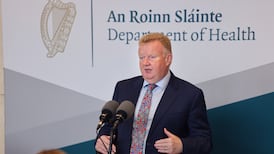Tackling big medical issues in a realistic manner is part of The Clinic's success. Fiona Tyrrell goes behind the scenes of the RTÉ series The Clinic - and finds a team of medical experts helping the actors get it right.
The return of a disgraced plastic surgeon with a cocaine addiction, the reappearance of a former receptionist with De Clerambault's Syndrome and a case of middle-class drug addiction: RTÉ's medical drama, The Clinic, is back with a bang for a second season.
With the help of a team of dedicated medical professionals, husband and wife GPs Ed (David Wilmot) and Cathy (Aisling O'Sullivan) Costello continue to run the clinic in the Haddington Road area of Dublin city.
At the end of last month, the show, which is set in a modern day Dublin GP clinic, pulled its highest audience ratings with an impressive 438,000 viewers tuning in (some 39 per cent of the share).
The show also picked up three nominations in this year's Irish Film and Television awards.
While actors, directors and scriptwriters work furiously to ensure the dramatic content keeps audiences hooked, a team of medical experts work equally hard to keep the show medically accurate.
Co-creator and co-producer of the show Orla Bleahen-Melvin had the original idea for The Clinic while attending various clinics for back problems. She realised that these clinics were fertile ground for human drama, but was determined to keep the series character-centred rather than medically led.
Nonetheless, the show has not shied away from big medical story lines and the topics and procedures covered on the show are broad ranging - Alzheimer's disease, anaphylactic shock, MS, breast reduction, alopecia, Leukaemia, botox and tattoo removal.
Three GPs, a counsellor, acupuncturist, homoeopath, physiotherapist, a plastic and cosmetic surgeon and two nurses are employed to make themselves available for research purposes for the show.
They provide story lines and advise on how to tackle medical issues and how to depict procedures, according to Dee Collier, researcher with the show.
Initially, they work through the script "word for word" to ensure that it is accurate and to spot any glaring mistakes early on.
During the filming process, the medical panel will view the daily takes. They are also required, from time to time, to be present on set to ensure procedures are portrayed accurately.
Sometimes, it's for something as simple as advising on whether a plastic surgeon would wear a mask or tuck his tie in while doing a certain procedure, according to Dee.
Other times, such as when acupuncture needles are being inserted into a patient, they need to be there to oversee the procedure.
Finally, the medical panel will also check the final rough-cut of the episode before it goes to the post-production stage.
"The show more or less has a real life counterpart for every character on set," explains Dr John Bourke, a GP and acupuncturist from Newmarket in Co Cork, who was asked to come on board the medical panel with the arrival of new character Clodagh Delany, a GP and acupuncturist, this season.
Conflicts between the producers and the medical panel do emerge from time to time, according to Dr Burke.
"On one or two occasions, I could see where the dramatist was going with the story but I had to step in and say that it wouldn't happen in Ireland in 2004."
He cites a case where the writers wanted to include a scene where a GP had a heart-to-heart with a young patient on a park bench.
"All the alarm bells went off in my head. This would only take place within the four walls of a clinic."
Sometimes, the writers and producers underestimate what a GP can do today, he adds, such as the role of GPs in primary diagnosis and in hospital step-down.
Nonetheless, the show goes a long way towards getting away from the image of a general practitioner as a Dr Finlay-type character, he says.
It reflects the range of work done by a GP - what a doctor does and sees in their daily work in modern Ireland, he says.
Like so many others, Dr Burke enjoys watching medical dramas on TV and is a big fan of the American emergency department drama ER.
"I'm hooked on ER. It's technically superb and it is very rare for it to be caught out. However, it does happen once in a while, like when a doctor stood on the wrong side of the bed to diagnose appendicitis."
Although he prides himself on The Clinic being medically accurate, Dr Bourke admits that it tends towards idealism in terms of the seemingly unlimited resources available to general practitioners.
With its full complement of healthcare professionals - an on-site counsellor, physiotherapist and residential plastic surgeon - the clinic is no ordinary GP practice, according to Dr Bourke.
"Any doctor would look at that and simply ask 'Yes, but how much would that cost?'"
The Clinic, Sunday nights, 9.25 p.m., RTÉ One.








